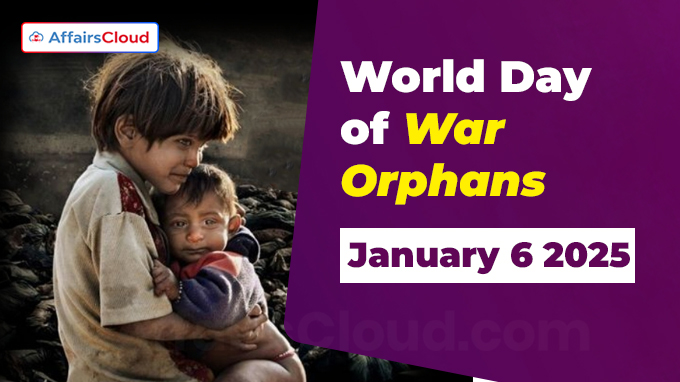 World Day of War Orphans is observed annually on January 6 across the globe to raise awareness about the challenges faced by children who have been left orphaned by wars and about the trauma experienced by war orphans globally.
World Day of War Orphans is observed annually on January 6 across the globe to raise awareness about the challenges faced by children who have been left orphaned by wars and about the trauma experienced by war orphans globally.
- The Day addresses social, psychological and physical obstacles confronted by war orphans, protects their rights and well-being and highlights the need for global attention and support.
Note:
- A war orphan is a child or children whose parents died while serving in military duty.
- The United Nations Children’s Fund (UNICEF) defines an orphan as any child under 18 years who lost one or both parents to any cause of death.
Objectives:
- Raising Awareness: Educating society about war orphans’ struggles.
- Mobilizing Resources: Securing support for education, healthcare, and rehabilitation.
- Policy Advocacy: Promoting policies to protect war orphans’ rights.
Background:
i.The World Day of War Orphans was proposed by the French organization SOS (Societas Socialis) Enfants en Détresse (SOS Children in Distress), to protect children from abuse and mistreatment.
ii.In Anno Domini (AD) 400, the Romans established the 1st orphanages to support widows and orphans of soldiers who died in battle, offering aid until the age of 18.
- In 1741, The Foundling Hospital, London United Kingdom (UK) became the 1st charity orphanage.
Violations against children:
In 2005, the United Nations (UN’s) Security Council identified and condemned 6 grave violations against children in times of war.
- Killing and maiming of children
- Recruitment or use of children in armed forces and armed groups
- Attacks on schools or hospitals
- Rape or other grave sexual violence
- Abduction of children
- Denial of humanitarian access for children.
Significance:
i.Over 473 million children more than 1 in 6 globally live in areas affected by conflict, the highest number since World War II.
- The percentage of children living in conflict zones has doubled from 10% in the 1990s to almost 19% today.
ii.By the end of 2023, 47.2 million children had been displaced due to violence, with additional displacements expected in 2024 (e.g., in Haiti, Lebanon, Myanmar, Palestine, Sudan).
iii.In 2023, 32,990 grave violations against children were verified, the highest number ever recorded.
- Haiti,Caribbean saw a 1,000% increase in sexual violence against children in 2024.
iv.Over 52 million children in conflict areas are out of school or repurposed in places like Gaza, Sudan, Ukraine, and Syria.
Other Global Observance:
‘World Orphans Day’ was observed annually worldwide on April 20, declared by Worldwide Organisation for Charity (WOC) to raise awareness and inspire support for orphans worldwide.
Indian Constitutional Provisions:
Article 21, Article 21(a), Article 29(2), Articles 23 and 24, Article 39(e), Article 39(f) of the Indian Constitution contain provisions pertaining to the protection of orphans and orphanages.
- Article 39(f) of the Indian Constitution empowers the state to enact laws protecting children from exploitation and abandonment.
About United Nations Children’s Fund (UNICEF):
Executive Director(ED)- Catherine M Russell
Headquarters- New York, United States of America (USA)
Established-December 11, 1946
Member Countries- 190




